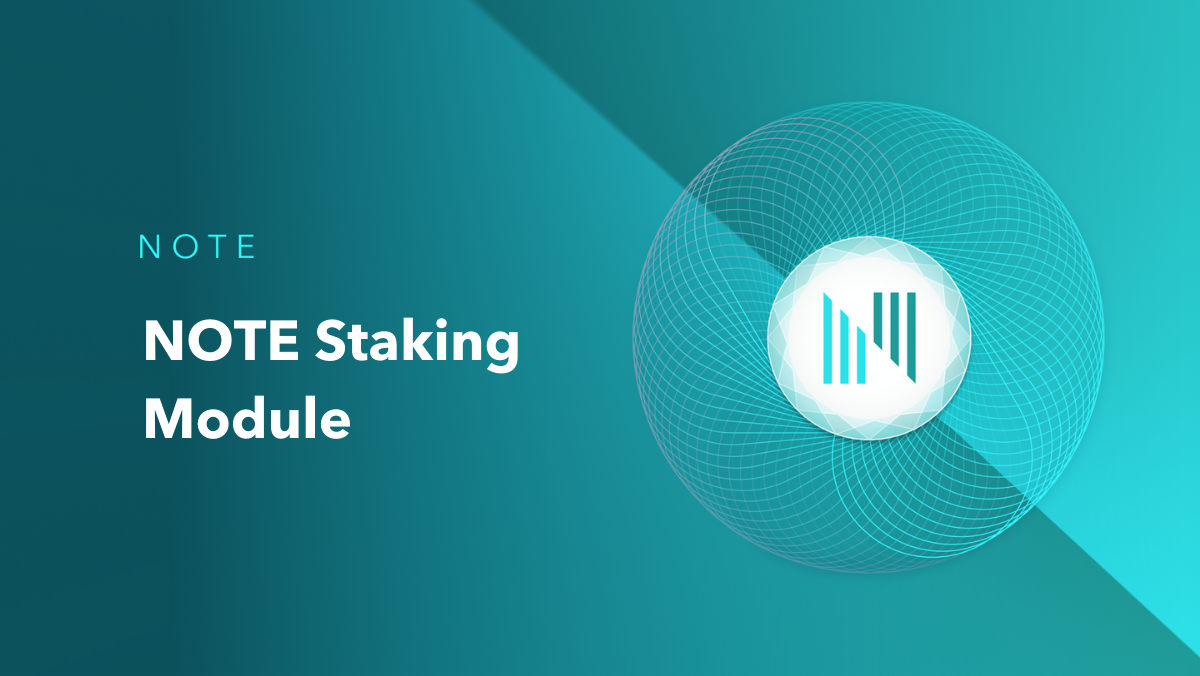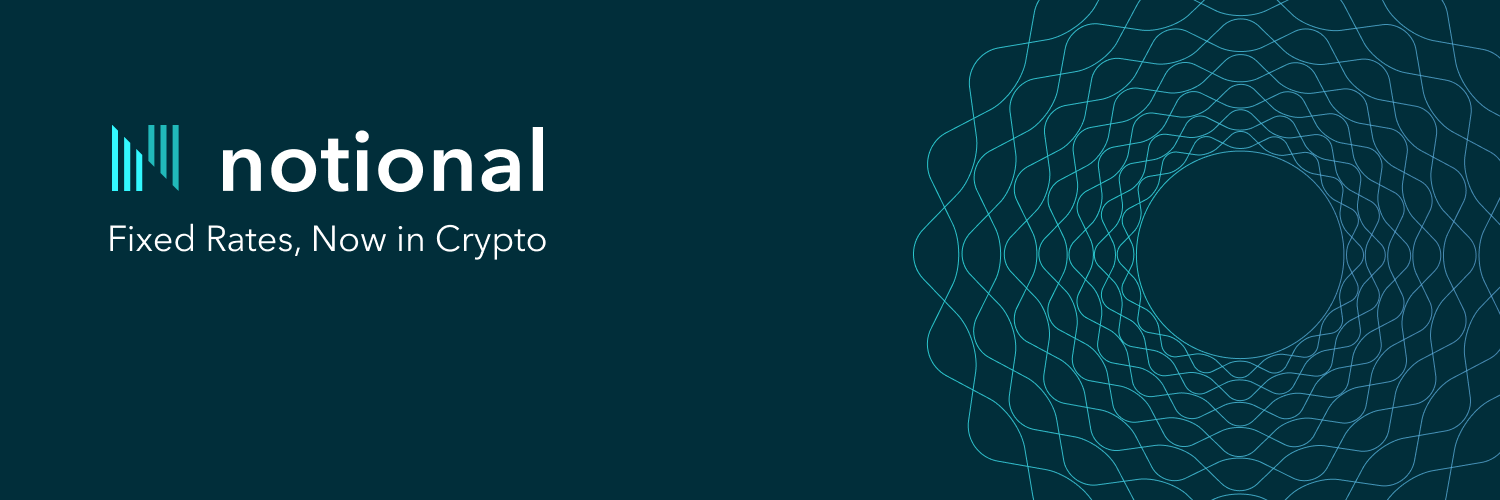
Introducing NOTE Staking
Today we are excited to announce the next step forward in the evolution of the Notional protocol: The NOTE staking module.
Today we are excited to announce the next step forward in the evolution of the Notional protocol: The NOTE staking module. NOTE stakers will benefit directly from Notional’s success by earning rewards while simultaneously contributing to NOTE liquidity and to the security of users’ funds on the protocol.
Summary:
- Users stake 80/20 NOTE/WETH Balancer LP tokens to receive sNOTE. The use of 80/20 weights instead of 50/50 weights minimizes potential impermanent loss for sNOTE holders.
- sNOTE holders earn additional Balancer LP tokens as rewards that are automatically staked. Rewards come from the reinvestment of protocol revenues, trading fees on the Balancer pool, and additional NOTE incentives.
- In the event of a collateral shortfall, up to 50% of sNOTE capital can be used to recapitalize the Notional system. This provides extra insurance to Notional users and strengthens the protocol.
- The NOTE staking module is currently on testnet and a mainnet launch is targeted for March 30th.
Motivation:
The NOTE staking module gives NOTE holders a direct way to benefit from Notional’s success while also contributing to a primary factor that drives Notional’s success - security. The module accomplishes this by increasing the attractiveness of holding NOTE and by creating an insurance fund.
The staking module will enable Notional’s treasury manager to undertake direct NOTE purchases with earned protocol revenues, and then distribute those repurchased NOTE to sNOTE holders in the form of 80/20 NOTE/WETH Balancer LP tokens. This will provide a lucrative opportunity to earn returns on NOTE for stakers.
As more NOTE holders decide to stake their NOTE, the size of the protocol’s insurance fund will grow. A large insurance fund lowers the risk of using Notional for everyone. Greater security will help attract more capital into the protocol. This will lead to more liquid markets, a more secure product for users, and will help drive Notional’s continuing success in becoming base-layer financial infrastructure for fixed rate lending in DeFi.
NOTE staking overview:
To stake NOTE, users convert their NOTE into 80/20 NOTE/WETH Balancer LP tokens and receive sNOTE in return. The pool re-balances your assets automatically so that users can obtain sNOTE with any proportion of NOTE to ETH.
sNOTE is redeemable at any time following a 15 day cooldown period for a proportional share of the LP tokens in the pool. As the pool accrues rewards, each sNOTE is redeemable for an ever-increasing number of LP tokens.
sNOTE returns:
sNOTE rewards accrue in the form of Balancer LP tokens. This means that, absent any sNOTE redemptions, the sNOTE pool will hold an increasing number of LP tokens. As the pool accrues rewards, each sNOTE is redeemable for an ever-increasing number of LP tokens.
Returns come from three sources:
- Protocol revenue re-investments. Notional earns transaction fees each time a user lends or borrows and COMP incentives due to the protocol's integration with Compound. The COMP incentives that Notional earns will be converted into LP tokens to reward sNOTE holders on a regular and ongoing basis.
- Additional incentives. The Notional community may choose to provide additional incentives to encourage NOTE staking. At launch, the community will allocate 30,000 NOTE per week in additional incentives to sNOTE holders for a minimum of 6 weeks.
- Trading fees on the Balancer pool. The Balancer pool earns trading fees any time a user swaps between NOTE and wETH. Currently the fee that Balancer LPs earn on trading is set to 0.5%. Trading fees increase the value of the LP tokens held in the sNOTE pool.
Forecasting sNOTE returns:
To calculate sNOTE returns, users need to balance the rewards and trading fees received against the potential impermanent loss of holding 80/20 NOTE/WETH LP tokens. The 80/20 pool minimizes IL for LP token holders, but if the price of NOTE moves a lot in a very short period of time, it can still be significant.
Interested users can find a step-by-step guide for how to estimate total sNOTE returns along with an example calculation here.
Collateral shortfall events:
A collateral shortfall is a scenario where Notional no longer holds the necessary collateral to make good on its liabilities to lenders and liquidity providers. In the event of a collateral shortfall, NOTE token holders can hold an on-chain vote to take 50% of the assets held in the sNOTE pool and use them to recapitalize the system. In this event, sNOTE holders would bear a loss of up to 50% of their assets.
Collateral shortfalls are critical events that should never happen if the system is working properly. Notional could experience a collateral shortfall for two reasons:
- Smart contract hack. The risk that a hacker exploits a vulnerability or design flaw in the Notional smart contracts that was missed in auditing and testing.
- Liquidation failure. The risk that the price of collateral assets held on Notional fall dramatically and liquidators are unable to liquidate accounts that have borrowed against that collateral before the accounts become insolvent. Minor liquidation failures will be covered by Notional's reserve funds. Only major liquidation failures would lead to collateral shortfalls.
Conclusion:
The NOTE staking module is a major step forward for the Notional protocol and for NOTE holders. sNOTE provides a potentially lucrative opportunity for NOTE holders to benefit from the protocol’s success and the insurance that sNOTE holders provide makes Notional an even safer and more attractive option for lenders and liquidity providers. This leads to a self-reinforcing cycle that will help to increase the value of NOTE, strengthen the protocol, and drive lending and liquidity volumes on the platform.
The Notional Team
About Notional Finance📈
Notional is the first decentralized, Ethereum-based protocol for borrowing and lending at fixed rates and fixed terms. With variable rate lending, DeFi can only serve a small segment of the crypto lending market because variable interest rates don’t provide the certainty that lenders and borrowers require. Notional fixes this by creating a true market for lenders and borrowers that empowers individual investors, business owners and institutional investors.
After raising a $10 million Series A in May 2021 from some of the top VC firms, including Coinbase Ventures, Notional’s protocol was relaunched on 11/1 with a host of new features as well as the NOTE governance token. Notional is now a top 10 DeFi lending protocol, with more than $495M in total value locked.
To find out more, follow Notional on Twitter @NotionalFinance, subscribe to the newsletter, join the Discord, or check out the website to learn more.

Notional Finance Newsletter
Join the newsletter to receive the latest updates in your inbox.







